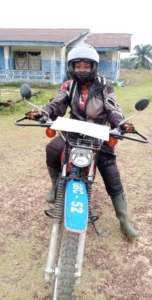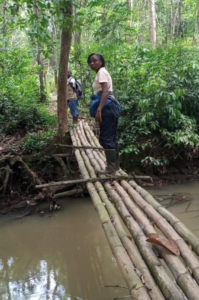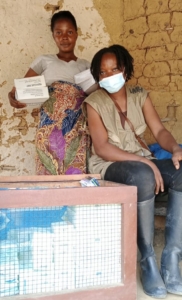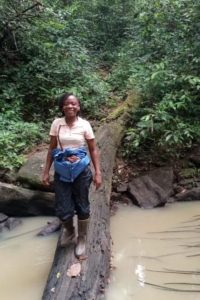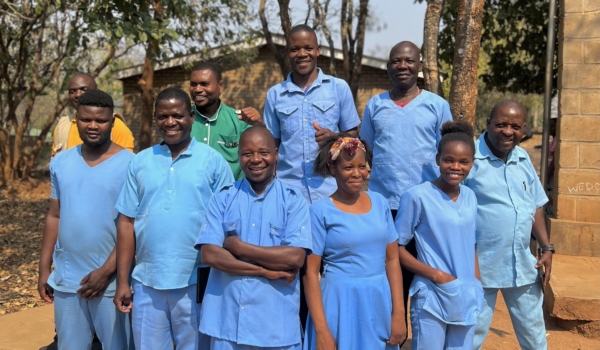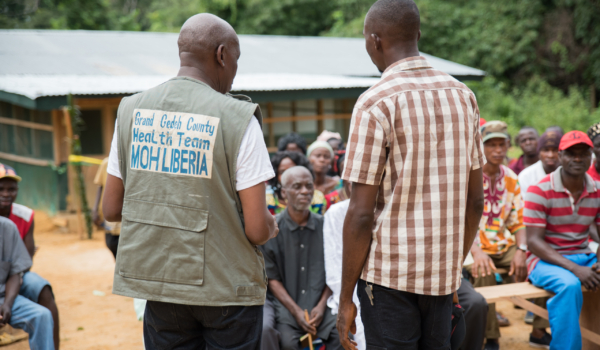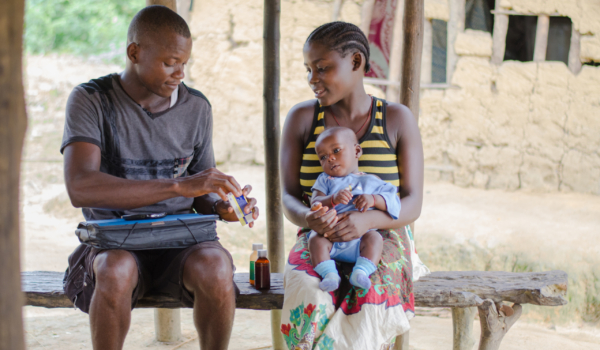What does it take to reach the last mile?
“I ride my motorbike two hours or more to get to communities in the rainy season,” explains Pillar Nufepolu, who works as a community health services supervisor in Liberia’s remote Grand Bassa County. To get to the most distant community, the dense forest, high waters, and narrow paths make travel an even greater challenge. “I park my motorbike when I can’t drive it any further, and then I walk for three hours,” says Pillar. “My community health worker meets me at the road and carries the medicines on his head.”
A key link in Liberia’s community health system, Pillar and other supervisors work with community health workers (known nationally as community health assistants) to ensure they are providing quality primary care to improve health outcomes at the community level. They provide supervision and guidance in the correct diagnosis and treatment of malaria, pneumonia, and diarrhea as well as screenings for malnutrition in children under five; see that home visits and other tasks are being performed at a high standard; restock supplies; advise on difficult cases; serve as a referral link with the nearest health center; and ensure reports of illness are being recorded—a vital component to tracking and responding to outbreaks.
“Community health services supervisors provide crucial first-line support that makes community health workers’ services possible,” explains Savior Flomo Mendin, Last Mile Health’s County Manager for Grand Bassa County. “They equip the community health workers with the knowledge and skills to provide services in the community and then accompany them throughout their work, delivering essential drugs and supplies, providing mentorship and coaching to them to improve and sustain the quality of care they deliver.”
Pillar has been working as a supervisor for nearly four years. “I supervise seven community health workers,” she says. When she visits communities, she conducts audits to check in on the quality of care patients are receiving and keep community health workers accountable to their neighbors. “To do a patient audit, I will review the sick child ledgers and pick one entry,” she explains. “I will go to the house and talk to the caregiver and ask about the care received, the demeanor of the community health worker (were they nice, kind), and also if they provided health education alongside diagnosis and treatment.” She conducts community audits, as well: “I will talk to people in the community,” she says. “Is the community health worker doing routine visits? Are they working like they are supposed to be?”
Coaching and mentoring, too, are essential parts of her work. “For example, I coach community health workers on how to identify community triggers and record them in the ledgers, and I make sure they are following the module for their routine visits,” she says. She also checks to ensure they are properly using the middle-upper arm circumference (MUAC) tape to screen children for malnutrition. “All the community health workers in my area are correctly using the MUAC,” she reports.
Like many supervisors in the community health system, Pillar is a nurse by training—and the broad range of skills nurses must master prepares them well for the demands of frontline care. “Nurses’ roles range from assessing and diagnosing diseases, to prescribing and administering medications and performing other medical procedures, to delivering babies, to educating other health professionals, families, and communities,” explains Savior, who is also a registered nurse. “Given our roles as educators, clinical mentors, and service providers, we are uniquely positioned to support community health workers as well as deliver care. About 1.2 million Liberians live in remote communities—and the farther away people are from the cities, the more likely they are to be cut off from even basic and routine services. As frontline health workers serving remote communities, nurses are key to improving service delivery and bridging the gap in healthcare access.”
The areas Pillar serves are rural and remote: Liberia’s last mile. Distance, she says, is the greatest challenge. “There are bad roads, damaged during the rainy season,” she says. “Some communities you can only walk to and the paths will be flooded. Sometimes the communities take so long to get to that you have to sleep there.” For these patients and the community health workers who serve them, she is an essential link to the health system—and the medicines they need. She always carries supplies, and at every visit she does a restock. “If I do 21 visits in a month, I do 21 restocks,” she says.
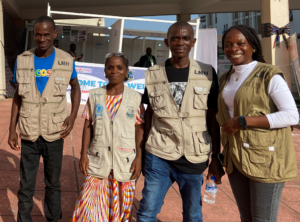
Pillar (right) and other community and frontline health workers at the Community Health Workers Symposium in Monrovia.
Although it comes with many challenges, Pillar carries a deep conviction in the importance of her work—and the work of the community health workers she supervises. “They need to increase the salary for community health workers. The money is small for the amount of work,” she says. She has seen the direct impact of this work: increased vaccination rates for children under five, better screening and treatment for diseases like malaria, a larger percentage of pregnant women choosing to deliver in health facilities. “Their work is really working,” says Pillar. “Their work is huge.”
This March, Pillar attended the 3rd International Community Health Workers Symposium in Monrovia. Alongside community and frontline health workers from Liberia and beyond, she educated symposium attendees about her work—and advocated passionately for greater investment in community health. “I want to work to bring more attention to community health because it’s really changing the lives of our people,” she says.
For her communities, Pillar is driving that change. “Pillar is a remarkable nurse and has touched the lives of many,” says Savior. “For example, in 2021, she and a community health worker in Tarloe town identified a child who was severely malnourished. Following the referral, Pillar worked tirelessly alongside the community health worker to assess the child, provide health education, and encourage follow up care at the healthcare facility. The child is now fully recovered and thriving with his family. This has increased the admiration and trust of the community toward Pillar.”
Pillar wants others to understand the crucial role community health workers and their supervisors play in ensuring patients receive care—no matter where they live. “My work is unique,” says Pillar. “When you work in community health, what you are doing has a positive impact in your community. Deaths from diarrhea are reduced. People are not walking two or three hours just to treat malaria. Women are planning their families.”

